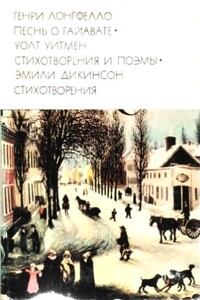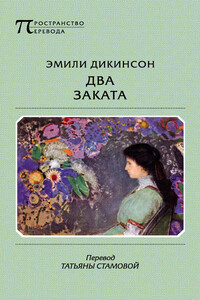Избранные переводы - [3]
x x x
47 Heart! We will forget him! You and I - tonight! You may forget the Warmth he gave I will forget the Light! When you have done, pray tell me That I may straight begin! Haste! lest while you're lagging I may remember him!
x x x
49 I never lost as much but twice, And that was in the sod. Twice stood I beggar Before the doors of God!
Angels - twice descending Reimbursed my store Burglar! Banker - Father! I am poor once more!
x x x
90 Within my reach! I could have touched! I might have chanced that way! Soft sauntered thro'h the village Sauntered as soft away! So unsuspected Violets Within the meadows go Too late for striving fingers That passed, an hour ago!
x x x
107 'T was such a little-little boat That toddled down the bay! 'T was such a gallant- gallant sea That beckoned it away! 'T was such a greedy, greedy wave That licked it from the Coast; Nor ever guessed the stately sails My little craft was lost!
x x x
126 To fight aloud is very brave But gallanter, I know, Who charge within the bosom, The Cavalry of Woe
Who win, and nations do not seeWho fall- and none observeWhose dying eyes, no Country Regards with patriot love
We trust, in plumed procession For such the Angels goRank after Rank, with even feetAnd Uniforms of Snow.
x x x
135 Water, is taught by thirst; Land - by the Oceans passed. Transport - by throe Peace - by its battles told Love, by Memorial Mold Birds, by the Snow.
x x x
185 "Faith" is a fine invention When Gentlemen can see But Microscopes are prudent In an Emergency
x x x
224 I've nothing else - to bring, You know So I keep bringing TheseJust as the Night keeps fetching Stars To our familiar eyes
Maybe, we shouldn't mind themUnless they didn't comeThen - maybe, it would puzzle us To find our way Home
x x x
249 Wild Nights- Wild Nights! Were I with thee Wild Nights should be Our luxury!
Futile - the Winds To a Heart in port Done with the Compass Done with the Chart!
Rowing in Eden Ah, the Sea! Might I but moor - Tonight! In Thee!
x x x
254 `Hope` is a thing with feathers That perches in the soul And sings the tune without words And never stops - at all
And sweetest - in the Gale - is heard And sore must be the storm That could abash the little Bird That kept so many warm
I've heard it in the chillest land And on the strangest Sea Yet, never, in Extremity, It asked a crumb - of Me.
x x x
303 The Soul selects her own Society Then - shut the Door To her divine Majority Present no more
Unmoved-she notes the Chariots-pausingAt her low Gate Unmoved - an Emperor is kneeling Upon her Mat
I've known her - from an ample nation Choose One Then- close the Valves of her attentionLike Stone
x x x
313 I should have been too glad, I see Too lifted - for the scant degree Of Life's penurious Round; My little Circuit would have shamed This new Circumference - have blamed The homelier time behind.
I should have been too saved - I see Too rescued - Fear too dim to me That I could spell the Prayer I knew so perfect - yesterday -That Scalding one - "Sabachthani"Recited fluent -- here
Earth would have been too much - I see And Heaven- not enough for me I should have had the Joy
Without the Fear - to justify The Palm - without the Calvary; So, Saviour, Crucify
Defeat whets Victory - they sayThe Reefs - in old GethsemaneEndear the Coast beyond! 'T is Beggars - Banquets best define; 'T is parching - vitalizes Wine, "Faith" bleats - to understand!
x x x
371 A precious-mouldering pleasure-'t isTo meet an Antique Book, In just the Dress his Century wore A privilege - I think
His venerable Hand to take And warming in our own A passage back- or two- to make To Times when he- was young
His quaint opinions - to inspect His thoughts to ascertain On Themes concern our mutual mindThe Literature of Man
What interested Scholars- mostWhat Competitions ran When Plato - was a Certainty And Sophocles - a Man
When Sappho - was a living Girl And Beatrice wore The Gown that Dante- deified Facts Centuries before
He traverses - familiar As One should come to Town And tell you all your Dreams-were trueHe lived - where Dreams were born
His presence is Enchantment, You beg him not to go Old Volumes shake their Vellum Heads And tantalize - just so
409
THE BATTLE-FIELD. They dropped like Flakes Tthey dropped like Stars Like Petals from a Rose When suddenly across the June A wind with fingers - goes
They perished in the Seamless Grass, -No eye could find the place But God can summon every face On his Repealless - List .
* * *
470 I am alive - I guess The Branches on my Hand Are full of Morning Glory And at my finger's end The Carmine - tingles warm And if I hold a Glass Across my Mouth - it blurs it Physician's - proof of Breath
I am alive - because I am not in a Room The Parlor - Commonly - it is So Visitors may come And lean - and view it sidewise And add " How cold - it grew" And " Was it conscious - when it stepped In Immortality? "
I am alive - because I do not own a House Entitled to myself - precise And fitting to no one else
And marked my Girlhood's name So Visitors may know Which Door is mine - and not mistake And try another Key

Генри Лонгфелло, Уолт Уитмен, Эмили Дикинсон, каждый по-своему, воплотили в поэтическом творчестве грани сознания своего современника — американца XIX века. Наследие каждого из них, став вехой на путях американской культуры, а тем самым культуры мировой, и в наши дни продолжает оставаться живой поэзией.Перевод И. Бунина, К. Чуковского, Б. Слуцкого, А. Старостина, И. Кашкина, А. Сергеева, С. Маршака, Р. Сефа, М. Зенкевича, Н. Банникова, В. Левика, М. Алигер, В. Марковой, И. Лихачева.Вступительная статья Е. Осеневой.Примечания И.

В книге рассказывается история главного героя, который сталкивается с различными проблемами и препятствиями на протяжении всего своего путешествия. По пути он встречает множество второстепенных персонажей, которые играют важные роли в истории. Благодаря опыту главного героя книга исследует такие темы, как любовь, потеря, надежда и стойкость. По мере того, как главный герой преодолевает свои трудности, он усваивает ценные уроки жизни и растет как личность.

Эмили Дикинсон (1831–1886) родилась в Амхерсте (штат Массачусетс) и прожила там недлинную и малоприметную жизнь. Написав около двух тысяч стихотворений и великое множество писем, она осталась не замеченной и не узнанной современниками. Только XX век смог распознать в ней гениального поэта, но сравнить её по-прежнему не с кем.На русский язык стихи Э. Дикинсон начала переводить Вера Маркова. С тех пор к ним обращались уже многие переводчики. Переводы Татьяны Стамовой отдельной книгой выходят впервые.

Читателю предлагаются новые переводы Эмили Дикинсон. Чем вызвано их появление? Очевидно, что существующих на русском языке переводов мало. Громадную работу по знакомству русскоязычного читателя с поэзией Э. Дикинсон выполнила В. Н. Маркова. Ее слух, отточенный переводами японских хокку, позволил ей сделать колоссальный шаг в сторону Дикинсон по сравнению с робкими, многословными и малочисленными попытками предшественников. Работа В. Н. Марковой стала пробным камнем для последующих переводчиков. Тем не менее переведена все еще малая часть наследия Эмили и вовсе нет переводов ее писем, которые сами по себе поэзия.Представляемая подборка почти полностью совпадает с опубликованными в билингве "Американская поэзия в русских переводах", М., Радуга, 1983.

В книге рассказывается история главного героя, который сталкивается с различными проблемами и препятствиями на протяжении всего своего путешествия. По пути он встречает множество второстепенных персонажей, которые играют важные роли в истории. Благодаря опыту главного героя книга исследует такие темы, как любовь, потеря, надежда и стойкость. По мере того, как главный герой преодолевает свои трудности, он усваивает ценные уроки жизни и растет как личность.

Книга «Дорога в небо» представляет избранные стихотворения гениальной американской поэтессы Эмили Дикинсон. Автор переводов – Елена Айзенштейн, автор нескольких книг о творчестве Марины Цветаевой, многих статей, посвященных русской поэзии 20—21 века. В книге приведены параллельно английский и русский тексты.